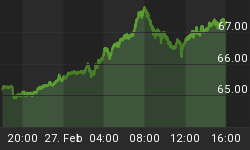09:00 EST, Thurs 4 June
Gold Bounces in Sterling & Euros as Rates Stay Near Zero, "Queasing" Continues
THE SPOT PRICE OF GOLD bounced off one-week lows versus the Dollar for the second time Thursday lunchtime in London, rallying from $961 per ounce after the US currency spiked on a vote of "no change" to Eurozone interest rates.
The single currency dipped below $1.41 for the first time since last Thursday, helping unwind one-third of this week's drop in Euro Gold Prices at €685.
Holding rates at a record low of 1.0%, the ECB is already planning €60 billion ($42bn) of quantitative easing to start in June.
Today it said staff have joined the International Monetary Fund (IMF) in "assessing the situation" in European Union member Latvia, where a $100 million auction of government debt failed to attract a single bidder on Wednesday.
"Gold shows a large technical reversal," says a note from London market-makers Scotia Mocatta, "removing us from the bullish view we have ridden since the break above $900 at the beginning of May."
Gold's near-3% drop from new 7-week highs against the Dollar was variously termed "profit taking" and "liquidation" by other analysts.
"Sentiment in coming weeks will not be blowing in the direction of a much higher Gold Price," reckons Mark Hulbert of the eponymous Financial Digest, writing at Barrons.com, because it currently stands near peak bullish levels.
Hulbert's Gold Newsletter Sentiment Index - which averages the position in gold recommended by short-term timing advisories - approached 57% on Monday, near the peaks of March 2008 and Feb. '09 when Gold Prices broke but failed to hold above $1,000 per ounce.
"A Dollar-inspired rally might not have legs," warns VM Group in its Asian Metals Monthly for Fortis Bank. But "sentiment is important and, with the yield on the 10-year US Treasury bond rising rapidly, suggesting real concerns about the credit-worthiness of governments worldwide, gold will remain solidly on the radar screen of many nervous investors."
For British investors now Ready to Buy Gold, the price today jumped 1.3% from a 6-week low after
the Bank of England held its key interest rate at 0.5% per year, pegging the real rate of interest at minus 1.8% after inflation.
The Bank said it will continue its £125 billion "asset purchase" program, creating new money to buy corporate bonds and UK gilts from investment institutions.
Both gilt and German Bund prices were little changed by Thursday's central-bank news, but US Treasury bonds slipped, pushing 10-year yields towards 6-month highs ahead of tomorrow's key non-farm payrolls data.
UK and European stocks struggled to rise, meantime, holding almost 3% below Monday's new 7-month highs.
Asian stock markets closed the day lower after Japan reported a 25% drop in capital spending from a year earlier.
"I still think it's possible to hit $1,000," said Singapore gold analyst Adrian Koh at Phillip Futures to Reuters this morning, "but the markets are currently at an important crossroads and any further selling pressures could change that."
Like Koh, Walter de Wet at Standard Bank here in London now sees support for Gold Prices at $960 an ounce, adding that "Buying on dips is our preferred strategy."
"The downtrend [in commodities] is over," said Barclays Capital analyst Phil Roberts to Bloomberg earlier, noting that the Reuters/Jefferies CRB index of 19 key raw materials crossed above its 200-day moving average on Monday, "signalling an end to the downtrend" marked by 2008's record 36% slump.
Goldman Sachs today raised its 12-month target for crude oil prices to $90 per barrel, because "as the financial crisis eases, an energy shortage lies ahead."
"The reality is that the ECB are done cutting rates and will not be announcing any further policy initiatives," reckons economist James Nixon at SocGen in London. "[But] I'm very concerned that much more has to be done to stimulate the economy from here."
Reprimanded by German chancellor Angela Merkel this week for joining the US Fed and Bank of England in using "quantitative easing" to boost the money supply, the European Central Bank saw almost a third of its 1,500 staff strike on Wednesday to protest against cuts to retirement benefits.
Trade unions leaders accused the ECB of a "democratic deficit", saying that it has adopted the motto "consult and ignore".
Over recent months, ECB management have held 25 meetings with union leaders to discuss both pension benefits and temporary contracts, held by a fifth of the bank's staff.















